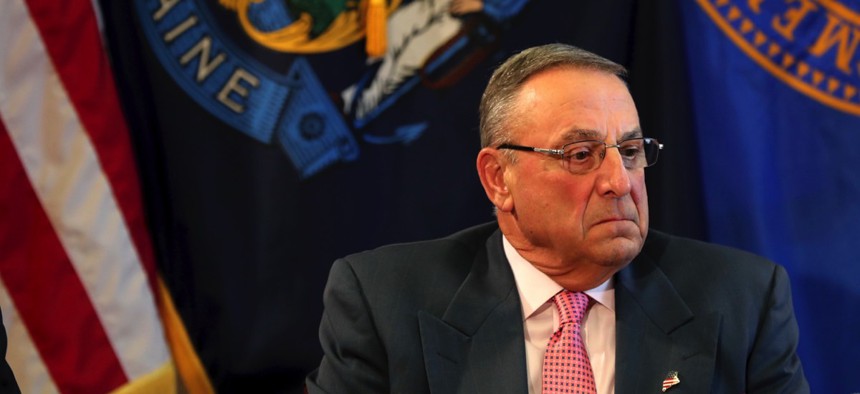60% of Maine Voted for Medicaid Expansion, But Gov. LePage Has Some Conditions

Maine Gov. Paul LePage.
The Republican governor says he will block Medicaid expansion (again) until the state legislature can find a way to pay for the program.
Mainers have spoken.
They came out in higher-than-expected numbers on Tuesday and, by a solid majority, voted to expand Medicaid in the nation’s first public referendum to decide such an issue. But now, Republican Gov. Paul LePage—who has vetoed Medicaid expansion votes by the legislature on five separate occasions—is making it clear that he won’t be providing access to health care for 80,000 additional Mainers just yet.
LePage released a statement Wednesday that his administration would not be implementing the Medicaid expansion unless state lawmakers find a way to pay for it, as well as stipulating what funding methods are in and out-of-bounds.
“Credit agencies are predicting that this fiscally irresponsible Medicaid expansion will be ruinous to Maine’s budget,” the governor wrote.
“Therefore,” LePage added, “my administration will not implement Medicaid expansion until it has been fully funded by the Legislature at the levels DHHS has calculated, and I will not support increasing taxes on Maine families, raiding the rainy day fund or reducing services to our elderly or disabled.”
The governor isn’t alone. Maine House Minority Leader Ken Fredette, a Republican, made similar remarks on a local radio station on Wednesday.
In a statement, Maine House Speaker Sara Gideon, a Democrat, responded to LePage’s threats saying that the legislature plans to “fully and faithfully” implement the law.
“The legislature will move swiftly to fund Medicaid expansion as required by law. The governor and DHHS commissioner will implement its requirements as well, as they are obligated to do,” Gideon said.
She went further and added that “[a]ny attempts to illegally delay or subvert this law will not be tolerated and will be fought with every recourse at our disposal. Mainers demanded affordable access to healthcare yesterday, and that is exactly what we intend to deliver.”
According to Maine law, if a voter measure is approved that requires the state to spend money in excess of what the state has available, but does not specify a funding source, the measure doesn’t go into effect until 45 days after the legislature’s next meeting. In this case, that’s Jan. 3, 2018.
After that date, LePage would have 90 days in which to submit the paperwork to the federal government to initiate expansion. That is his duty under Maine’s constitution.
Quinn Libson is a Staff Correspondent for Government Executive’s Route Fifty, based in Washington, D.C.
NEXT STORY: The 'Horrifying' Consequence of Lead Poisoning






